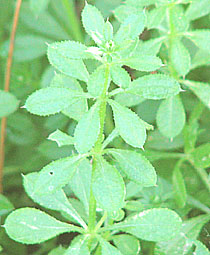
Clivers - herb to reduce swelling in legs of Stabled Horses
 The
herb Clivers is a good herbal supplement for helping
to reduce swelling in the legs of horses or ponies
stabled overnight.
The
herb Clivers is a good herbal supplement for helping
to reduce swelling in the legs of horses or ponies
stabled overnight.
Clivers, also known as cleavers, goose grass, catch weed or scratch weed, is the weed that produces the little hairy seeds that stick to dogs and cats, or stick to your socks when you take a walk in the country.
It is regarded by many people as a troublesome weed but is an excellent tonic herb for horses, and most of them will eat it enthusiastically.
Clivers has many positive actions for horses, all of which are enhanced when given in tandem with Calendula (marigold) as the two herbs have a supporting and enhancing action on each other.
Many horse owners find clivers to be useful in helping reduce enlarged lymph glands and it is used routinely for equine urinary infections (eg cystitis) and for reducing fluidy swellings in horses such as windgalls and filled legs.
Clivers can also be used to support the horse's lymphatic system and to improve the quality of the hoof.
HOW TO FEED CLIVERS TO A HORSE OR PONY
When the herb is growing freely you can pick a large bunch of Clivers for your horse or pony several times a week (just throw it in his stable or field).
You will often find that after a few days the horse loser interest in the herb; if this happens leave it for a week and then try again.
You will probably that find your horse will 'self-dose' in this way.
During Autumn - and Winter Clivers can be bought ready dried from many horse feed merchants or online suppliers of equine herbal supplements and fed at the rate of 20- 30 grams of the dried herb per day.
If you are mixing it with calendula, give 30 grams each day of combination (ie l5 grams of each herb).
These dried herbs can be added to your horse’s
feed but be aware that they are slightly diuretic so you may find your
horse’s stable gets a bit wetter than usual
HORSE CARE ARTICLES AND EQUINE ADVICE
Causes of horse nosebleeds | Herbs for Veteran Horses | Ringbone Treatment | Redworm | Equine Sweet Itch | Calming Herbs | Ragwort | Horse Colic | Treating Cracked Heels | Vegetables | Removing Bot Eggs | Soaking Hay | Linseed Jelly | Why Horses Eat Mud| Horse Feed Norfolk| Rain Scald | Livery yards Wilts |